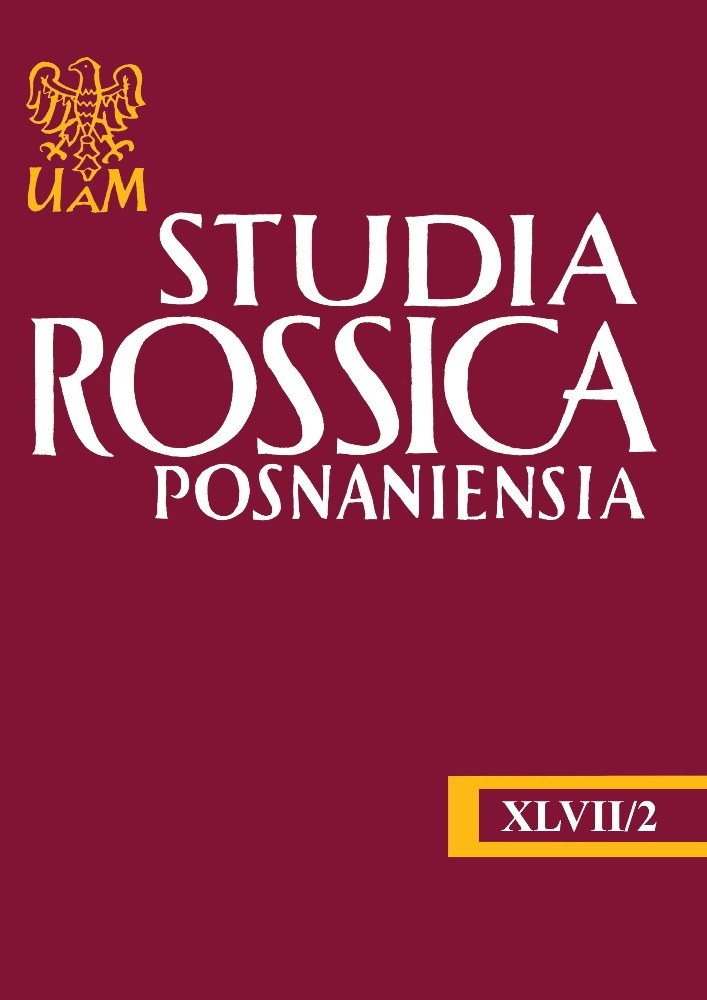Abstract
A new type of dictionary – a psychological linguistic dictionary was compiled as a result of analyzing 15918 Russian adjectives from the perspective of their relationship with emotions originating in reference to various senses. The dictionary contains information on “the emotional load” of these adjectives, that is how pleasant or how unpleasant emotions a given adjective evokes. The analyzed lexemes were assessed by respondents on the scale of emotions: slightly (un)pleasant – moderately (un)pleasant – very (un)pleasant, which was marked with an appropriate number of pluses or minuses. Although it is believed that representatives of different cultures experience universal emotions, their quality and intensity hidden behind particular linguistic units can diverge for different cultural linguistic communities. Emotions are conditioned socially, culturally and historically; they play an important role in international communication. Thus, when they are incompetently and mistakenly interpreted, this can disturb dialogue between various cultures and even lead to conflicts. In the article, considering equivalents mięsny/мясной and other counterparts, it can be said that not all the examples have a parallel emotional value. Despite the genealogical relationship between the languages and cultures in question, emotive contrasts are not rare. This leads to considering a significant issue of emotive adequacy of dictionary equivalents, which has to be addressed by translators and language teachers.
References
Atchley, Ruth Ann, Stephen S. Ilardi, Aubrey Enloe. "Hemispheric asymmetry in the processing of emotional content in word meanings: The effect of currentand past depression". Brain and Language, 84, 2003, s. 105-119. https://doi.org/10.1016/S0093-934X(02)00523-0 DOI: https://doi.org/10.1016/S0093-934X(02)00523-0
Barhudarov, Leonid. Âzyk i perevod. Moskva, Meždunarodnye otnošeniâ, 1975.
Bernat, Edward, Scott Bunce, Howard Shevrin. "Event-related brain potentials differentiate positive and negative mood adjectives during both supraliminal and subliminal visual processing". International Journal of Psychophysiology, 42, 2001, s. 11-34. https://doi.org/10.1016/S0167-8760(01)00133-7 DOI: https://doi.org/10.1016/S0167-8760(01)00133-7
Clore, Gerald L., Andrew Ortony. "The semantics of the affective lexicon". Cognitive Perspectives on Emotion and Motivation. Red. V. Hamilton et al., 1988, s. 367-397. https://doi.org/10.1007/978-94-009-2792-6_15 DOI: https://doi.org/10.1007/978-94-009-2792-6_15
Gawarkiewicz, Roman, Izabela Pietrzyk, Barbara Rodziewicz. Polski słownik asocjacyjny z suplementem. Szczecin, Print Group, 2008.
Hejwowski, Krzysztof. Kognitywno-komunikacyjna teoria przekładu. Warszawa, Wydawnictwo Naukowe PWN, 2012.
Jäger, Gert. "Die sprachlichen Bedeutungen - das zentrale Problem bei der Translation und ihrer wissenschaftlichen Beschreibung". Bedeutung und Translation. Red. Gert Jäger, Albrecht Neubert. Lepzig, VEB Verlag Encyklopädie, 1986, s. 5-66.
Lewicki, Roman. Zagadnienia lingwistyki przekładu. Lublin, Wydawnictwo UMCS, 2017.
Małgorzewicz, Anna. "Przekład jako medium rozumienia kultury i międzykulturowej integracji w kontekście językoznawstwa kognitywnego". Rocznik Przekładoznawczy, 2, 2006, s. 169-179. https://doi.org/10.12775/RP.2006.013 DOI: https://doi.org/10.12775/RP.2006.013
Mikołajczuk, Agnieszka. Obraz radości we współczesnej polszczyźnie. Warszawa, Semper, 2009.
Nemanick, Richard C., David C. Munz. "Measuring the poles of negative and positive mood using the positive affect negative affect schedule and activation deactivation adjective check list". Psychological Reports, 74, 1994, s. 195-199. https://doi.org/10.2466/pr0.1994.74.1.195 DOI: https://doi.org/10.2466/pr0.1994.74.1.195
Neshat-Doost, Hamid T., Ali Moradi, Reza Taghavi, William Yule. "The development of a corpus of emotional words produced by children and adolescents". Personality and Individual Differences, 27, 1999, s. 433-451. https://doi.org/10.1016/S0191-8869(98)00253-0 DOI: https://doi.org/10.1016/S0191-8869(98)00253-0
Orzechowska, Joanna. "Lingvokulʹturologičeskij obʺekt MEDVEDʹ v russkom âzyke". Acta Polono-Ruthenica, 18, 2013, s. 197-206.
Orzechowska, Joanna. "Rola i struktura komentarza lingwokulturologicznego (na przykładzie Kołobka)". Rocznik Instytutu Polsko-Rosyjskiego, 2 (7), 2014, s. 102-115.
Orzechowska, Joanna. "Słownik psychologiczno-lingwistyczny «Zmysły, emocje i przymiotniki języka rosyjskiego». Nowe narzędzie w pracy tłumacza". Acta Neophilologica, 21 (2), 2020, s. 199-208. https://doi.org/10.31648/an.5596 DOI: https://doi.org/10.31648/an.5596
Panasiuk, Igor. "Miejsce modelu lakun w obrębie teorii tłumaczenia kultur". Teoria i dydaktyka przekładu. Red. Krzysztof Hejwowski. Olecko, Wszechnica Mazurska, 2003, s. 99-112.
Pascalis, Vilfredo De, Enrica Strippoli, Patricia Riccardi, Fabiola Vergari. "Personality, event-related potential (ERP) and heart rate (HR) in emotional word processing". Personality and Individual Differences, 36, 2004, s. 873-891. https://doi.org/10.1016/S0191-8869(03)00159-4 DOI: https://doi.org/10.1016/S0191-8869(03)00159-4
Peabody, Dean. "Selecting representative trait adjectives". Journal of Personality and Social Psychology, 52 (1), 1987, s. 59-71. https://doi.org/10.1037/0022-3514.52.1.59 DOI: https://doi.org/10.1037/0022-3514.52.1.59
Raport z badań "Marketing, promocja oraz analiza rynku, analiza rynku produkcji ekologicznej w Polsce, w tym określenie szans i barier dla rozwoju tego sektora produkcji". Warszawa, 2017. Web. 28.03.2021. www.online-http://wzcz.sggw.pl/wp-content/uploads/2020/01/Raport_MINROL_15_11_2017_upowsz-1.pdf.
Ruzin, Igorʹ. "Kognitivnye strategii imenovaniâ: modusy percepcii (zrenie, sluh, osâzanie, obonânie, vkus) i ih vyraženie v âzyke". Voprosy âzykoznaniâ, 6, 1994, s. 79-99.
Šahovskij, Viktor. Lingvističeskaâ teoriâ èmocij. Moskva, Gnozis, 2008.
Scott, Berit, Mats Brandberg, Arne Öhman. "Measuring the negative mood component of stress experiences: Description and psychometric properties of a short adjective check-list of stress responses". Scandinavian Journal of Psychology, 42, 2001, s. 1-7. https://doi.org/10.1111/1467-9450.00208 DOI: https://doi.org/10.1111/1467-9450.00208
Tiller, Dale K., John F. Campbell. "Biased adjective selection criteria as a factor in mood adjective check list?". Psychological Reports, 58, 1986, s. 619-626. https://doi.org/10.2466/pr0.1986.58.2.619 DOI: https://doi.org/10.2466/pr0.1986.58.2.619
Tokarz, Bożena. "Tłumacz, emocje i przekład". Poznańskie Studia Slawistyczne, 9, 2015, s. 381-394. https://doi.org/10.14746/pss.2015.9.23 DOI: https://doi.org/10.14746/pss.2015.9.23
Zabiyako, Anna, Andrey Zabiyako. "Marginalʹnye pisʹmennye teksty russkih trëhrečʹâ: častnye istorii formirovaniâ marginalʹnoj ètničnosti". Cuadernos de Rusística Española, 13, 2017, s. 229-242.
License
THE ARTICLES ARE PUBLISHED UNDER THE CREATIVE COMMONS LICENCE:
Attribution-NonCommercial-ShareAlike 4.0 International License.
Authors of texts accepted for publication in “Studia Rossica Posnaniensia” are required to complete, sign and return to the editor's office the Agreement for granting a royalty-free license to works with a commitment to grant a Creative Commons sub-license.
Under the agreement, the authors of texts published in “Studia Rossica Posnaniensia” grant the Adam Mickiewicz University in Poznań a non-exclusive, royalty-free license and authorize the use of Attribution-NonCommercial-ShareAlike 4.0 International (CC BY-NC-SA 4.0).
The authors retain the right to continue the free disposal of the work.
Internet users are entitled to use works published in “Studia Rossica Posnaniensia” since 2016, for non-commercial purposes only, under the following conditions: https://creativecommons.org/licenses/by-nc-sa/4.0/
Adam Mickiewicz University in Poznań retains the right to magazines as a whole (layout, graphic form, title, cover design, logo etc.).

